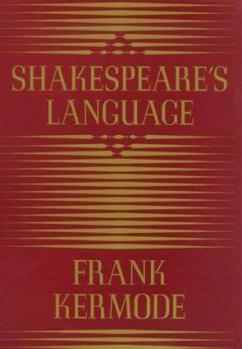Shakespeare's Language
Select Format
Select Condition 
Book Overview
In this landmark of Shakespearean studies, Britain's most distinguished scholar of 16th-century and 17th-century literature offers a distillation of his thinking on the Bard.
Format:Hardcover
Language:English
ISBN:0374226369
ISBN13:9780374226367
Release Date:January 2000
Publisher:Farrar Straus Giroux
Length:324 Pages
Weight:1.31 lbs.
Dimensions:1.1" x 6.3" x 9.3"
Customer Reviews
3 ratings
Sheakespeare's music
Published by Thriftbooks.com User , 24 years ago
Frank Kermode's book is inspiring. It is rich and gives very interesting details. But it keeps the basic axiom of elizabethan studies : Shakespeare's language is poetry and it is centered on words. The remarks in this book are totally essential to know, if we want to understand that the axiom is too short. Shalespeare's language is music. Shakespeare was bred and fed in the century long musical movement that produced the English madrigal, at exactly the same time as Monteverdi did it in Italy. This madrigal is founded on a binary music with a ternary variation. Shakespeare works on that element and extends it to all the levels of language : semantics (words), syntax, figures of speech, sounds, aliterations, rhythm, etc. And he adapts his linguistis music to each play. The second element to be taken into account is Shakespeare's extreme awareness of numerals and their symbolical value. Ric hard III is based on the number 9, the cacodemon, and on both specular or mirror symetry and translative symetry. That's one example. If we study Shakespeare's language and plays along that line we find that the number 2 and its multiples are positive and the number 3 is always a variation that introduces some un-balance. 7 is the acme of disruption in As You Like It and the art is to avoid the seventh step, the seventh age of man, the seventh level of lying. 8 in the same play is perfection. In this book, since I'm working on Antony and Cleopatra, Kermode gives us the key to the strange style of the play, particularly of Cleopatra's language and some essential scenes, but he does not know. The key is given by the 17 « become » (and other forms) and the 44 « fortune ». 17 = 11 + 6 (6 = 2x3) and 44 = 11 x 4. This appearance of the number 11, unique to my knowledge in Shakespeare's plays, is a direct reference to the Last Supper after Judas as left (the number of disciples left). Hence it is the number of treason, hence of the snakes. Since my study is due, you bet I am going to work on that element. Conclusion : Shakespeare's language is music and it is numerically mapped. Dr Jacques COULATREDEAU, Paris Universities IX and II.
Maping the Mapmaker
Published by Thriftbooks.com User , 24 years ago
Shakespeare mapped and maybe invented most of the human mind's conceptual network; he showed all of us what it is to be a conscious human being. Of all the critics, Kermode best understands this. His book is a wonderful guide the plays, but more importantly, to the mind that made mind.
Shakespear'e Language
Published by Thriftbooks.com User , 24 years ago
One of the best if not the best books on Shakespeare I have ever read. By examining Shakespeare's failures and shortcomings, Kermode manages to make one appreciate Shakespeare's towering overall triumph in a way that someone like Harold Bloom fails to do.
Shakespeare's Language Mentions in Our Blog

All the World's a Stage: Shakespeare-Related Reads for All Ages
Published by Ashly Moore Sheldon • July 17, 2020
With the cancelation of so many of our summer adventures, we are relying on literature to take us where we want to go. This week, a mini Shakespeare Festival with reads for all ages!






